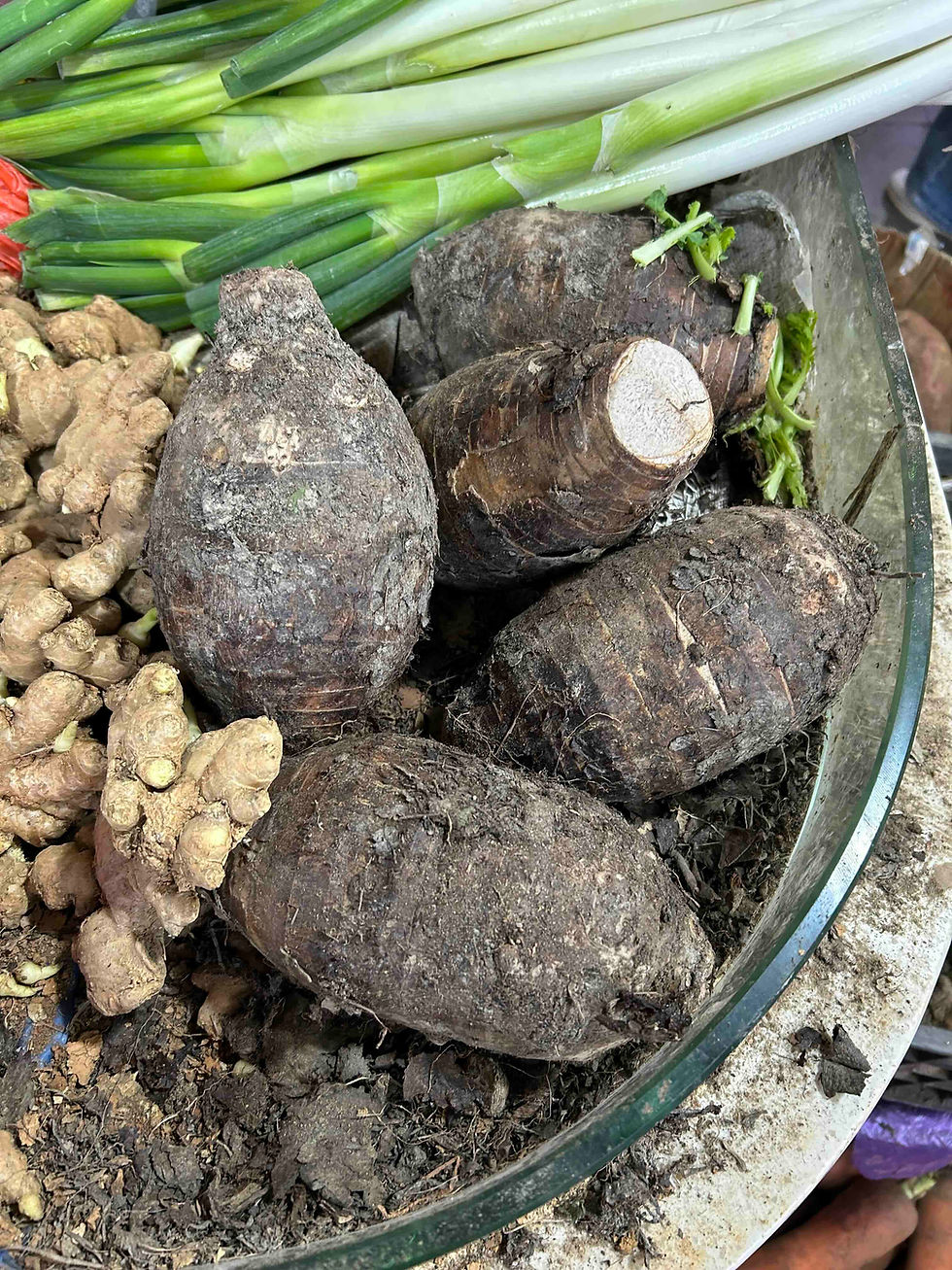A Magical Hangover Cure from the 12th Century
- Rachelle

- Mar 21, 2020
- 4 min read
Updated: Apr 6, 2020
氷壺珍
Delicacy in the Icy Jar
太宗問蘇易簡曰:“食品稱珎,何者為㝡?”對曰:“食無定味,適口者珍。臣心知虀汁羙。”太宗咲問其故。曰:“臣一夕酷寒,擁爐燒酒,痛飲大醉,擁以重衾。忽醒,渴甚。乘月中庭,見殘雪中覆有虀盎。不暇呼童,掬雪盥手,𫞜飲數𦈢。臣此時自謂上界仙廚,鸞脯鳳脂,殆恐不及。屢欲作《氷壺先生傳》記其事,未暇也。”太宗咲而然之。後有問其方者,僕荅曰:“用清麵菜湯浸以菜,止醉渴一味耳。”或不然,請問之氷壺先生。
Emperor Taizong (598-649, r. 626-649) asked Su Yijian (958-996), "Among all food that can be considered as delicacies, what is the best?"
[Su Yijian] replied, "There is no definitive flavour of food – whatever suits one's taste is a delicacy. I know in my heart that pickling brine is beautiful."
Emperor Taizong smiled and asked why. [Su Yijian] said, "One freezing cold evening, I warmed the wine by the stove, got drunk as a skunk, and buried myself in layers of duvet. Suddenly I woke up with a desperate thirst. Under the moonlight in the courtyard, I saw a pickle jar covered in melting snow. With no time to call over the page, I washed my hands with the snow and drank cupfuls [of the brine]. At that moment, I thought to myself, 'Even if I had an immortal chef from the celestial world [make] simurgh jerky or phoenix fat, I'm afraid they wouldn't be as good!' I always wanted to write an 'Account of Mr. Icy Jar' to record this incident, but I haven't had the time."
Emperor Taizong smiled in agreement.
Later, when people asked for the recipe, I said, "Take some clear vegetable noodle soup and soak in some veggies – a remedy for stopping the thirst after drinking; that's it." Or perhaps not. Please ask Mr. Icy Jar about it.
*From Shanjia qinggong 山家清供 (Light offer from a mountain house) by Lin Hong林洪 (fl. 12th century)
I quite like how Lin Hong backs up each recipe with a lovely short story or literary reference throughout his cookbook Shanjia qinggong. This recipe here for a magical hangover cure, however, is a bit difficult to follow. Ji 虀 refers to finely chopped vegetables and fruits pickled in salty brine, like sauerkraut. The context (winter; a jar in the courtyard) also suggests some fermentation process was going on in Su Yijian's icy jar, but Lin Hong didn't include any of the crucial details (e.g. amount of salt, use of oil, etc.) for fermentation in his recipe. If you just leave some vegetables in noodle soup casually, it's most likely that the whole thing goes sour by the next morning. For most people, that's not a pleasant taste, but I have an uncle who has a peculiar liking for the sourness of overnight congee. So, is Lin Hong also talking about his peculiar liking here? The last sentence seems to suggest he wanted to leave it open: If you don't think this recipe is a good one, simply try and find the recipe for YOUR icy jar!
(Above) My parents' pickle jars, an earthenware widely used in southern China. The conversation between Emperor Taizong and Su Yijian might have taken place in Chang'an (modern Xi'an, Shaanxi), the capital at the time. However, we should definitely note that Su Yijian was a native of Sichuan!
Another complaint I have about this anecdote is the lack of elaboration on Su Yijian's ingenious idea of "simurgh jerky and phoenix fat." I'm wondering if anybody has picked up this expression in his/her cookbook – it would make a nice title for the poultry section. I always thought, compared to other meat, poultry doesn't have much fat, let alone the wild birds (assuming simurghs and phoenixes are not domesticated fowl). I'm not sure about the taste of bird jerky, and I've certainly never imagined a phoenix, presumably elegant and majestic, could have enough fat content for culinary adventures.
Apart from that, Su Yijian certainly had a good point about delicacies. He offered a perfect excuse for not guaranteeing any sensational gastronomic experience in my "Classical Chinese Flavours" series. You'll see experiments on recipes from classical Chinese cookbooks. I'm not sure about your taste, but I'll let you know how they fit alongside mine.
PS: Su Yijian died of excessive drinking.
Copyright Declaration*:
The Chinese texts and images used on the website of Rachelle’s Lab are either from the public domain (e.g. Wikipedia), databases with open data licences (e.g. Shuhua diancang ziliao jiansuo xitong 書畫典藏資料檢索系統, National Palace Museum, Taipei), online libraries that permit reasonable use (e.g. ctext), or my own work.
Although fair use of the website for private non-profit purposes is permitted, please note that the website of Rachelle’s Lab and its content (including but not limited to translations, blog posts, images, videos, etc.) are protected under international copyright law. If you want to reproduce, distribute, or make derivative work based on the website content, please contact me, the copyright owner, to get written permission first and make sure to link to the corresponding page when you use it.
版權聲明:
本站所使用的圖片,皆出自公有領域(如維基)、開放數據庫(如臺北故宮博物院書畫典藏資料檢索系統)、允許合理引用的在線圖書館(如中國哲學電子化計劃)及本人創作。本站允許對網站內容進行個人的、非營利性質的合理使用。但請注意,本站及其內容(包括但不限於翻譯、博文、圖像、視頻等)受國際版權法保護。如需基於博客內容進行複製、傳播、製作衍生作品等,請務必先徵求作者(本人)書面許可,并在使用時附上本站鏈接,註明出處。
*Read more about copyright and permission here.








Comments